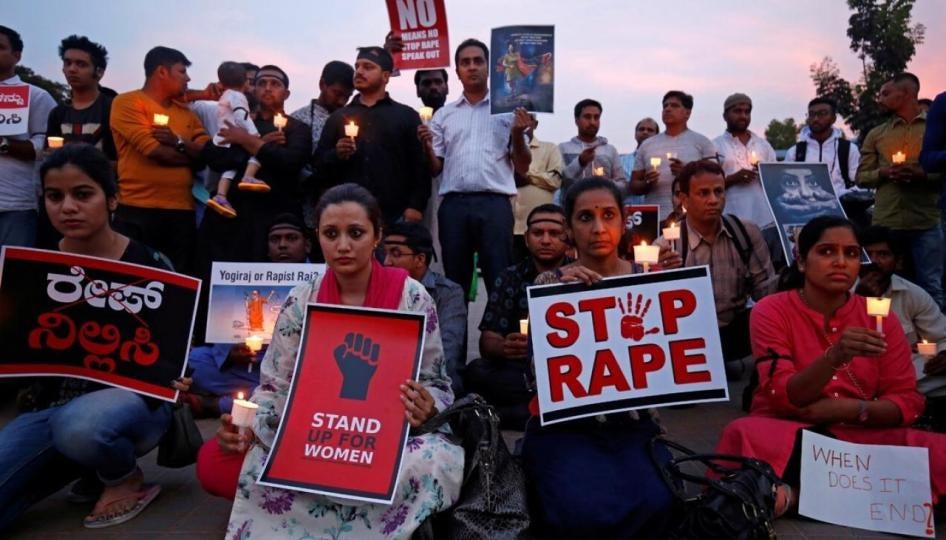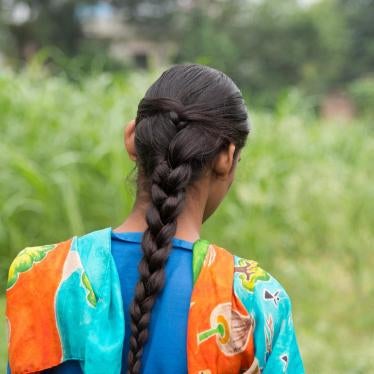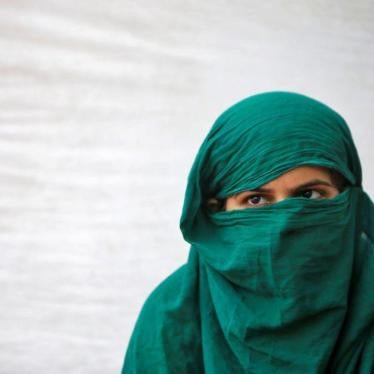(New York) – The Indian parliament should not adopt into law an ordinance which introduces capital punishment for those convicted of raping a girl under 12 years of age, Human Rights Watch said today. India should instead work towards abolishing the death penalty which is inherently cruel and irreversible, with little evidence that it serves as a deterrent.
The government passed the ordinance on April 21 following widespread protests after attempts by some leaders and supporters of the ruling Bharatiya Janata Party (BJP) to defend Hindu perpetrators of the abduction, ill-treatment, rape, and murder of an 8-year-old Muslim child in Jammu and Kashmir state. In Uttar Pradesh state, authorities not only failed to arrest a BJP legislator accused of raping a 17-year-old girl, but also allegedly beat her father to death in police custody.
“With this populist call for hangings, the government wants to cover up the fact that its supporters may have engaged in a hate crime,” said Meenakshi Ganguly, South Asia director. “If the government is serious about dealing with violence against women and children, it will have to do the hard work of reforming the criminal justice system and ensure that perpetrators are not protected from prosecution by political patronage.”
Two BJP ministers in Jammu and Kashmir state government joined an affiliated group called the Hindu Ekta Manch to protest the arrest of the accused in the horrific case in the state. The accused include a former government official and four police personnel. The ministers have since resigned.
Following the 2012 gang rape and death of Jyoti Singh Pandey, a medical student in Delhi, the Indian government enacted legal reforms to respond to sexual assault and rape. The Criminal Law (Amendment) Act, 2013, added new categories of offenses regarding violence against women and girls and made punishment more stringent, including death penalty for repeat offenders. Similarly, the Protection of Children against Sexual Offences Act, 2012, established guidelines for the police and courts to deal with victims sensitively and provided for the setting up of specialist child courts.
“There was hope that these measures would encourage more victims and their families to step forward, and result in more successful prosecutions,” Ganguly said.
While the number of rape cases reported in 2016 increased by 56 percent over 2012, there remains much to be done to change the way the justice system responds to victims.
In a November 2017 report, “Everyone Blames Me,” Human Rights Watch found that survivors, particularly among marginalized communities, still find it difficult to register police complaints. They often suffer humiliation at police stations and hospitals, are still subjected to degrading tests by medical professionals, and feel intimidated and scared when the case reaches the courts. They face significant barriers when trying to obtain critical support services such as health care, counseling, and legal aid.
Although Indian law makes it mandatory for police officials to register rape complaints, Human Rights Watch found that police sometimes press the victim’s family to “settle” or “compromise.”
In cases of children, not only has the government not established effective oversight mechanisms that could help prevent child sexual abuse, but existing measures remain poorly implemented.
For women and girls with disabilities, who face a higher risk of sexual violence, the challenges are even greater, Human Rights Watch has found.
However, instead of fixing these structural barriers, the Indian government has expanded the use of capital punishment for rape. Now the parliament should ensure that this ordinance does not become part of permanent legislation.
The government’s ordinance comes despite the fact that both a high-level government committee and India’s Law Commission came out against the death penalty. Human Rights Watch opposes the use of the death penalty in all cases.
The new ordinance also increases minimum punishment for rape of girls and women. While the Protection of Children Against Sexual Offences Act covers sexual abuse against both girls and boys, the ordinance does not cover rape of boys.
-
For rape of women above 16 years of age, minimum punishment is increased from 7 years to 10 years in prison;
-
For rape of girls between 12 to 16 years of age, minimum punishment is now 20 years which may extend to life in prison;
-
For gang rape of girls between 12 to 16 years of age, minimum punishment is life in prison;
-
For rape of girls under 12 years of age, minimum punishment is 20 years in prison which may extend to life in prison or death penalty;
-
For gang rape of girls under 12 years of age, minimum punishment is life in prison or death penalty.
In India, according to the 2016 government data, out of 38,947 cases of rape reported by children and women, the accused was known to the victim in 94.6 percent of the cases. In 630 cases, the accused was the victim’s father, brother, grandfather, or son; in 1,087 cases, the accused was a close family member; in 2,174 cases the accused was a relative; and in 10,520 cases, the accused was a neighbor.
Rape is already underreported in India largely because of social stigma, victim-blaming, poor response by the criminal justice system, and lack of any national victim and witness protection law making them highly vulnerable to pressure from the accused as well as the police. Children are even more vulnerable due to pressure from family and society.
With this background, an increase in punishment, including the death penalty, may, in fact, lead to a decrease in reporting of such crimes.
“The Indian government has repeatedly said that it is committed to dealing with violence against women and children. But actions speak louder than words,” Ganguly said. “The new amendments are ill-conceived and hasty. Protecting children requires a far more thoughtful approach and politicians need to summon the political will to deliver it.”









